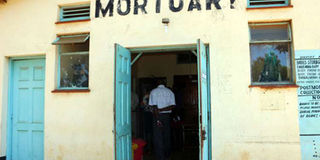Alarm over fake morticians, shortage of embalmers

The Busia County Referral Hospital Mortuary. PHOTO | TONNY OMONDI | NATION MEDIA GROUP
What you need to know:
- Morticians lamented that they face a lot of stigma and negative stereotyping owing to lack of public understanding of the work they do, some of them personal.
Chief government Pathologist Johansen Oduor who was the chief guest during the conference said that many times, people who work in mortuaries have been viewed as abnormal. - Dr Oduor added that the location of mortuaries at corners or in secluded compounds have also contributed to stigmatisation of mortuary workers and morgues in general.
There could be at least 1,000 fake morticians who are offering services to unsuspecting Kenyans, an association of funeral services has warned.
This is even as the Funeral Services Association of Kenya (FUSAK) members decried an acute shortage of about 400 embalmers, stigma and poor working conditions.
“We have qualified embalmers who know what they are doing but the funeral industry is being chocked with quack morticians and briefcase brokers,” said FUSAK National Chairman Ezra Olack during the association’s conference at Jambo Travellers hotel in Kilifi.
He said that the brokers, collect money from unsuspecting mourners at funeral gatherings with a promise of getting coffins, transport among other services in total disregard of the families’ emotional and physical needs.
Mr Olack said that bodies handled by professional morticians do not have foul smell or changes such as swellings whereas the morgues they work in, are clean and well maintained.
He added that they also have and wear protective gear at all times, handle and store bodies with respect.
He added: “If you ask quack embalmers the composition of water, formalin or other things they do not know, some are drunkards, smoke bhang or take drugs, sleep with corpses or what we call necrophilia. These are the people we want to eliminate in the industry because they are tarnishing our name.”
Henry Migade who works as an operations manager at Uganda Funeral Services said that people working in a morgue ought to have qualities such as empathy and sympathy towards families who have lost loved ones.
STIGMA
Morticians lamented that they face a lot of stigma and negative stereotyping owing to lack of public understanding of the work they do, some of them personal.
Chief government Pathologist Johansen Oduor who was the chief guest during the conference said that many times, people who work in mortuaries have been viewed as abnormal.
Dr Oduor added that the location of mortuaries at corners or in secluded compounds have also contributed to stigmatisation of mortuary workers and morgues in general.
“Mortuary business is shrouded in a lot of stigma. The public view is that mortuaries are places where bodies are dumped but in reality these are important places where forensic evidence can also be gathered and therefore should be respected.
“In South Africa where I did my forensic training, I was shown a morgue which was located along a street and I could not even tell that by looking at it,” said Dr Oduor.
SUFFER TRAUMA
He added that morticians also suffer from a lot of trauma and depression arising from the kind of bodies they handle some badly mutilated or families who wail at the sight of their deceased relatives.
A participant said that they encounter relationship challenges such as rejection or being dumped by men and women as a result of the stereotypes.
“It is very difficult for us when it comes to dating. The moment you tell a lady or a man that you are a mortician it is as if it scares them off,” he said.
David Chege who works as Mortician at Kenyatta University funeral home said that stigma is so rife that some people, often refuse to greet morticians or shun them altogether.
He added that family and friends of some morticians often probe them to understand ‘how they handle bodies and live normal lives’ while others abandon them.
Mr Olack said that a clear funeral policy stipulating the training, qualifications, standards and licensing of morticians and morgues can help in eliminating quacks.
“Morticians should be given adequate time to rest and heal We are also trying to show people the different terminologies used in the funeral industry as embalmers, funeral director as opposed to referring to them as mortuary attendants,” said Mr Olack.





